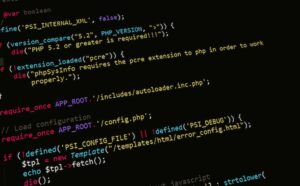-
Table of Contents
- Introduction
- Exploring the Role of AI in Enhancing Government Transparency
- Examining the Impact of AI on Government Decision-Making
- Assessing the Potential of AI to Improve Government Accountability
- Investigating the Use of AI to Enhance Citizen Engagement in Governance
- Analyzing the Potential of AI to Strengthen Democracy and the Rule of Law
- Conclusion
with AI Governance.
Introduction
The rise of artificial intelligence (AI) has created a new set of challenges for governments around the world. AI has the potential to revolutionize the way governments operate, from automating mundane tasks to providing more accurate and timely decision-making. However, the use of AI also raises important questions about how to ensure that AI-driven decisions are transparent, accountable, and consistent with democratic values. This is why AI governance is becoming increasingly important. AI governance is the process of establishing rules, regulations, and policies to ensure that AI is used responsibly and ethically. It is essential for governments to develop effective AI governance frameworks to ensure that AI is used in a way that enhances transparency and democracy.
Exploring the Role of AI in Enhancing Government Transparency
The use of artificial intelligence (AI) is becoming increasingly popular in government operations, and it is playing an important role in enhancing government transparency. AI can help governments to better understand the needs of their citizens, improve public services, and increase accountability.
AI can be used to analyze large amounts of data quickly and accurately, allowing governments to identify trends and patterns that may not be visible to the human eye. This can help governments to better understand the needs of their citizens and develop policies that are tailored to their needs. AI can also be used to monitor public services, ensuring that they are being delivered efficiently and effectively.
AI can also be used to increase government transparency. AI-powered systems can be used to track government spending, identify potential areas of corruption, and detect fraud. This can help to ensure that public funds are being used appropriately and that citizens are getting the services they need. AI can also be used to monitor the activities of government officials, ensuring that they are acting in the best interests of the public.
Finally, AI can be used to improve public engagement. AI-powered systems can be used to collect feedback from citizens, allowing governments to better understand their needs and develop policies that are tailored to their needs. AI can also be used to provide citizens with access to information about government activities, helping to increase transparency and accountability.
In conclusion, AI is playing an important role in enhancing government transparency. AI-powered systems can be used to analyze data, monitor public services, track government spending, identify potential areas of corruption, detect fraud, and improve public engagement. By leveraging the power of AI, governments can ensure that their citizens are getting the services they need and that public funds are being used appropriately.
Examining the Impact of AI on Government Decision-Making
AI (Artificial Intelligence) is rapidly becoming an integral part of government decision-making. AI can help governments make decisions faster, more accurately, and with greater efficiency. But how exactly does AI impact government decision-making?
AI can help governments make decisions faster by automating processes and providing real-time data. AI can quickly analyze large amounts of data and provide insights that would otherwise take much longer to uncover. This can help governments make decisions quickly and accurately.
AI can also help governments make more accurate decisions. AI can identify patterns and trends in data that humans may not be able to detect. This can help governments make decisions based on more accurate information. AI can also help governments identify potential risks and opportunities that may not be immediately apparent.
Finally, AI can help governments make decisions with greater efficiency. AI can automate processes and reduce the amount of time and resources needed to make decisions. This can help governments save money and resources, which can be used for other important initiatives.
Overall, AI is having a significant impact on government decision-making. AI can help governments make decisions faster, more accurately, and with greater efficiency. As AI continues to evolve, it is likely that its impact on government decision-making will only increase.
Assessing the Potential of AI to Improve Government Accountability
The potential of artificial intelligence (AI) to improve government accountability is immense. AI can help governments to better understand the needs of their citizens, identify areas of improvement, and ensure that public funds are being used responsibly.
AI can be used to analyze large amounts of data quickly and accurately. This can help governments to identify trends and patterns in public spending, allowing them to make more informed decisions about how to allocate resources. AI can also be used to detect fraud and corruption, helping to ensure that public funds are being used responsibly.
AI can also be used to improve the delivery of public services. AI-powered chatbots can be used to provide citizens with quick and easy access to information about government services. AI can also be used to automate processes such as filing taxes, making it easier for citizens to comply with government regulations.
AI can also be used to improve the transparency of government operations. AI-powered tools can be used to track the progress of government projects, allowing citizens to hold their government accountable for their actions. AI can also be used to monitor the performance of government officials, helping to ensure that they are meeting their obligations.
Finally, AI can be used to improve the security of government systems. AI-powered tools can be used to detect and prevent cyberattacks, helping to protect sensitive government data.
In conclusion, AI has the potential to significantly improve government accountability. By using AI to analyze data, detect fraud and corruption, automate processes, and improve security, governments can ensure that public funds are being used responsibly and that citizens are receiving the services they need.
Investigating the Use of AI to Enhance Citizen Engagement in Governance
As governments around the world strive to improve citizen engagement in governance, many are turning to artificial intelligence (AI) to help them achieve their goals. AI has the potential to revolutionize the way citizens interact with their governments, providing citizens with more efficient and effective ways to engage in the democratic process.
At its core, AI is a set of technologies that enable machines to learn from data and make decisions without human intervention. AI can be used to automate mundane tasks, such as data entry and analysis, freeing up government staff to focus on more important tasks. AI can also be used to provide citizens with more personalized services, such as tailored information and advice.
AI can also be used to improve the accuracy and speed of decision-making. By analyzing large amounts of data, AI can help governments identify trends and patterns that can be used to inform policy decisions. AI can also be used to identify potential problems before they become major issues, allowing governments to take proactive steps to address them.
Finally, AI can be used to improve the transparency and accountability of government decision-making. By providing citizens with access to data and insights into how decisions are made, AI can help to ensure that governments are held accountable for their actions.
As governments continue to explore the potential of AI to enhance citizen engagement in governance, it is important to remember that AI is not a panacea. AI is only as good as the data it is given, and it is important to ensure that the data used is accurate and up-to-date. Additionally, AI should be used in conjunction with other methods of engagement, such as public consultations and surveys, to ensure that citizens’ voices are heard.
Overall, AI has the potential to revolutionize the way citizens interact with their governments, providing citizens with more efficient and effective ways to engage in the democratic process. By leveraging the power of AI, governments can ensure that citizens are better informed and more involved in the decision-making process.
Analyzing the Potential of AI to Strengthen Democracy and the Rule of Law
The potential of artificial intelligence (AI) to strengthen democracy and the rule of law is an exciting prospect. AI can help to improve the efficiency and accuracy of decision-making, reduce the cost of government services, and increase access to justice. It can also help to reduce the risk of corruption and ensure that the law is applied fairly and consistently.
AI can be used to automate the processing of legal documents, such as contracts and court filings. This can reduce the time and cost associated with legal proceedings, making them more accessible to the public. AI can also be used to analyze large amounts of data to identify patterns and trends in the law, helping to ensure that the law is applied fairly and consistently.
AI can also be used to detect and prevent corruption. By analyzing large amounts of data, AI can identify suspicious patterns of behavior that may indicate corruption. This can help to ensure that public funds are used appropriately and that the rule of law is respected.
AI can also be used to improve the accuracy of decision-making. AI can be used to analyze large amounts of data to identify patterns and trends, helping to inform decisions. This can help to ensure that decisions are based on evidence rather than bias or prejudice.
Finally, AI can be used to improve access to justice. AI can be used to automate the processing of legal documents, making them more accessible to the public. AI can also be used to analyze large amounts of data to identify patterns and trends in the law, helping to ensure that the law is applied fairly and consistently.
In conclusion, AI has the potential to strengthen democracy and the rule of law. By automating the processing of legal documents, detecting and preventing corruption, improving the accuracy of decision-making, and improving access to justice, AI can help to ensure that the law is applied fairly and consistently.
Conclusion
AI and Governance have the potential to revolutionize the way governments interact with citizens and how citizens interact with their governments. AI can help governments become more transparent and accountable, while also providing citizens with more access to information and services. AI can also help governments become more efficient and effective in their decision-making processes. Ultimately, AI and Governance can help to enhance transparency and democracy, allowing citizens to have a greater say in the decisions that affect their lives.




